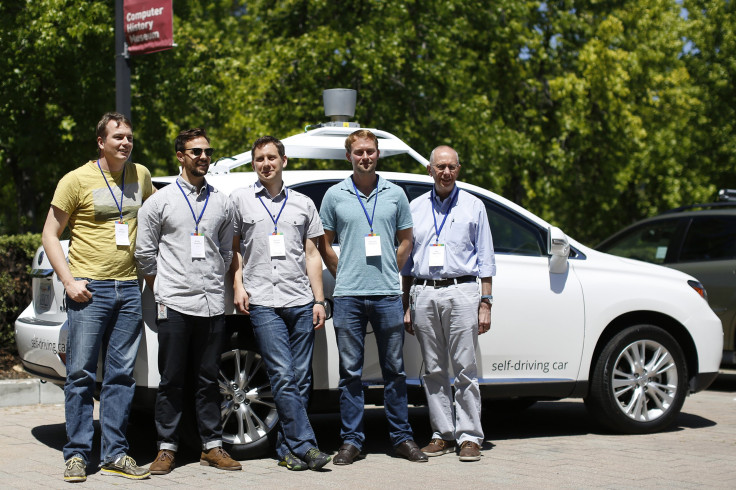Peter Schwartz Warns Auto Industry Could Wind Up In Silicon Valley’s Back Seat

Renowned business strategist and futurist Peter Schwartz is issuing a warning to the automotive sector: Step up or step aside in steering the future of cars. The tech industry, he says, could become the main driver of new motorized transport technologies, including Internet-connected, self-driving cars.
“If [automakers] don't adapt, they'll just be hardware suppliers to a software industry,” Schwartz told a packed audience Tuesday at the Los Angeles Auto Show’s Connected Car Expo. “The very business model -- who are the winners and losers -- is up for change.”
The founder of the Berkeley, California-based strategic planning consultancy Global Business Network said he envisions a future where either automakers adapt quickly to the changes taking place in passenger cars, or risk having tech companies like Google and Apple swoop in to fill consumer needs on their own.
Already Google’s Android and Apple’s iOS are battling for control of the vehicle dashboard touch-screen interface, and Google is taking a strong position on autonomous driving technology. And some Wall Street dreamers have even suggested that Apple dive right into car manufacturing by purchasing Tesla Motors Inc. (If it does, CEO Tim Cook might find himself, as Tesla CEO Elon Musk did during a recent conference call with analysts, lamenting how hard it is to engineer and make a car.)
The auto industry certainly recognizes the need to embrace the innovation.
Speaking at a business conference in the United Arab Emirates on Wednesday, Ford Motor Co. Executive Chairman Bill Ford, the great-grandson of Henry Ford, outlined his company’s vision of the future of driving, which seems to correspond with Schwartz’s advice.
“We are equipping cars and trucks with new technologies that improve the driving experience, guide you to your destination, manage the car’s functions and keep you and your passengers entertained,” Ford told an audience of business executives in Dubai. “So we are building smart cars, and they will continue to get smarter.”
Ford outlined a vision where the future of driving focuses on the needs of congested urban environments where smart infrastructure and smaller, more connected forms of transport will be needed to cope with higher population densities. In what would have been industry sacrilege 20 to 30 years ago, Ford offered up a vision of “access” to transport rather than “ownership,” transport that is shared rather than individually owned.
“In congested urban environments, we will see more peer-to-peer applications and on-demand transportation networks,” he said, pointing to ridesharing services like Uber.
Ford Motor Co. three years ago released its vision of automotive transport through 2050, which predicted the arrival as early as 2017 of semi-autonomous driving, vehicle-to-infrastructure communication (smart roads that adjust speed limits in real time, the ability to warn of road construction or traffic jams well ahead of time) and growth in small city cars to navigate congested urban environments. Ford sees fully autonomous driving by as early as 2025.
Whether automakers will be able to innovate these technologies without the help of Silicon Valley is unlikely. Already major companies, including Ford, Mercedes-Benz and BMW, have opened research labs in California to be close to where many of the innovations are taking place. But as many point out, making a car is not the same as designing a component that enables a car to perform a particular task.
“I don't foresee that GM, Daimler, Toyota, Hyundai or whoever is going to do their engine development in Silicon Valley or have their crash-testing in Silicon Valley,” Sven Beiker, executive director of the Center for Automotive Research at Stanford University, told Telematics Update, a publication devoted to vehicular technology.
A modern vehicle contains tens of thousands of individual parts and takes years to develop at a cost of billions of dollars. If auto companies wind up making hardware that supports the tech industry’s software, the hardware will still be what matters most.
Schwartz may be a renowned tech futurist admired by Silicon Valley, but his rosy outlooks haven’t always squared with reality. His 1999 book “The Long Boom: A Vision for the Coming Age of Prosperity,” co-authored with like-minded utopian visionaries Peter Leyden and Joel Hyatt, saw the first two decades of this century filled with tech-driven global prosperity and growth.
Published two years before 9/11 and eight years before the start of the longest period of U.S. economic contraction since the Great Depression, “The Long Boom” today seems more like an exercise in positive thinking, as some critics pointed out at the time, than a work of profound, relevant insight.
Schwartz’s message may be a warning that the automotive industry could wind up depending on Silicon Valley for some of its transport innovations, in much the same way the automotive industry relies on air bag manufacturers to provide these safety components. But motorized transport is built, not programmed.
© Copyright IBTimes 2024. All rights reserved.






















